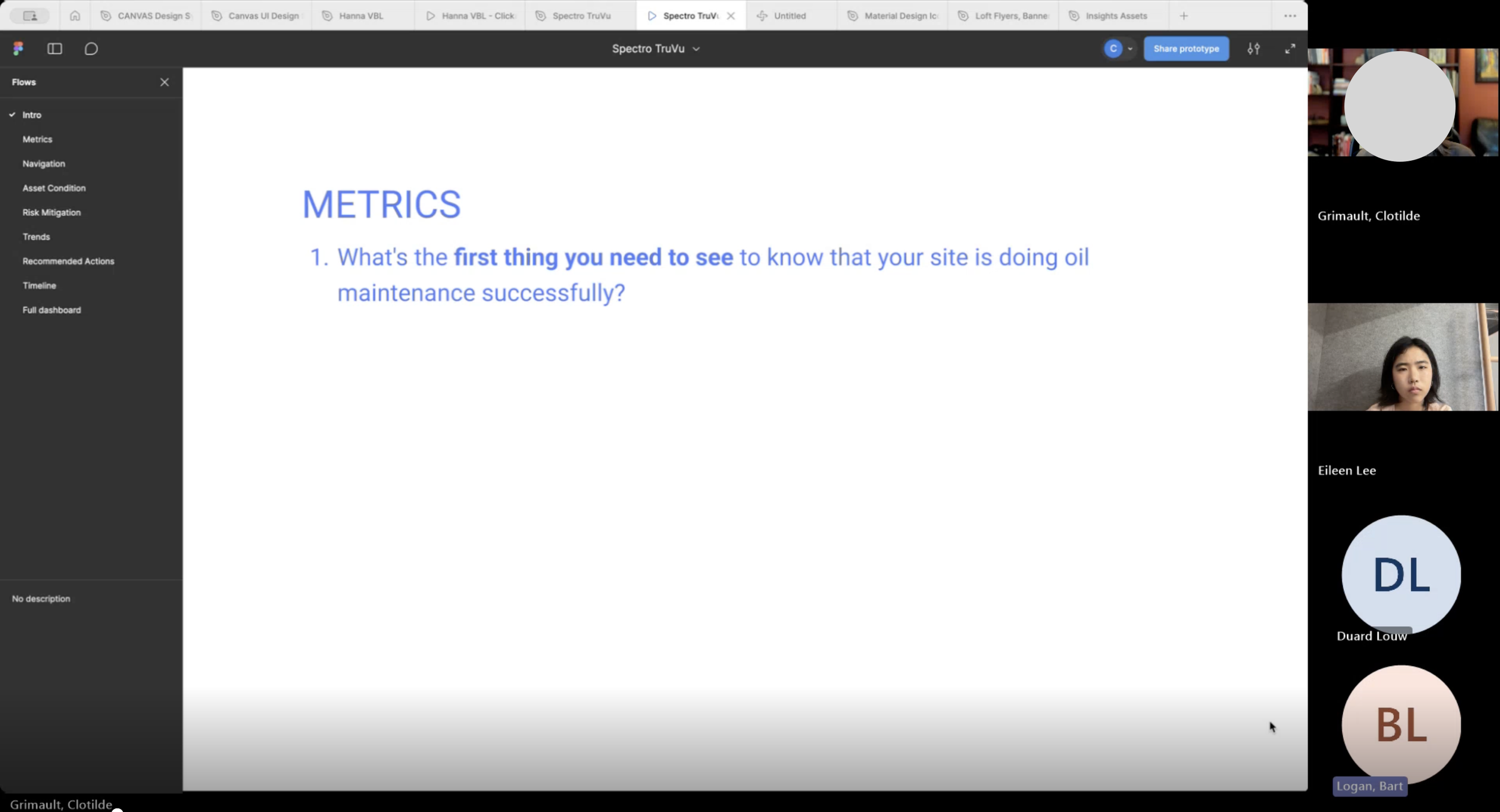UX DESIGN (MOBILE) • UX Internship
Spectro TruVu AI Prognostics Integration
Designing AI-powered insights for industrial maintenance workflows
Role
Lead UX Designer
Duration
12 weeks, 2025
Key Skills:
UX Design & Strategy
AI/Data Visualization Design
User Research & Validation
Technical Constraint Navigation
⚠️ Note: Due to NDA restrictions, detailed designs and proprietary information cannot be shown publicly. Full design process and solutions available during interview.
Tools:
Figma
Miro
Adobe Suite
Google Suite
Project Overview
The Challenge:
Industrial companies lose millions annually from unexpected equipment failures.
Spectro Scientific's TruVu platform analyzes oil samples to predict these failures, but their customers struggled to act on complex data insights quickly enough to prevent costly downtime. Together we ask:
How might we integrate AI prognostics into an existing enterprise platform to help industrial operators make faster, more confident maintenance decisions?
My Role
Lead UX Designer
Led design sprints for the dashboard redesign while collaborating with data scientists, engineers, and industrial customers over 12 weeks
The Impact
Achieved 84% average customer satisfaction
With AI dashboard concepts, with customers saying "This is exactly how we report on our oil maintenance program" and "A GREAT push in the right direction!"
Understanding the Industrial Context
Our customers weren't just data analysts, they were technical managers making million-dollar decisions, site managers preventing production shutdowns, and lab directors serving multiple industrial clients.
Each had different needs:
Managers: "What's urgent and requires immediate action?"
Technicians: "Actions to complete, in a very simple format"
Directors: "How many assets are safe for continued operation?"
Design Process: AI-Enhanced Customer Collaboration
1. Customer-First Validation
Rather than designing in isolation, my product manager and I conducted structured interviews with 3 existing TruVu customers across mining, manufacturing, and energy sectors.
The Process:
Presented dashboard concepts one panel at a time
Systematic 1-5 scale validation for usefulness and clarity
Captured specific feedback for each AI prognostics component
2. AI-Powered Design Iteration
Used AI tools to synthesize large volumes of customer feedback, identifying patterns across different industrial contexts that would have taken weeks to uncover manually.
The Solution: Graduated AI Integration
Instead of disrupting existing workflows, I designed a progressive enhancement strategy that introduced AI capabilities alongside familiar interfaces.
Dashboard Components Designed:
Recommended Actions - 86% satisfaction "Important to organize information to drive action"
AI-prioritized maintenance tasks with clear urgency indicators
Smart grouping by asset type and risk level
Trends Analysis - 86% satisfaction "Monthly trends are very relevant"
Historical patterns enhanced with AI forecasting
Progressive disclosure of complex analytics
Validation Results
84% Average Customer Satisfaction across all AI components
Key Customer/Stakeholder Reactions:
"A GREAT push in the right direction!"
"This is much, much better!"
"Engineers are used to this time view and know how to use it"
Critical Insights Uncovered:
Customization is key:
"Would need to be customizable by the consumer"
Explainability matters:
"Make sure to explain how metrics are calculated"
Integration over replacement:
Customers wanted AI to enhance, not replace existing tools "This is much, much better!
Technical Innovation: AI-Enhanced Design
Visual Element Suggestion: Technical Architecture Diagram
AI Synthesis:
Used machine learning to analyze interview transcripts, identifying design requirements that appeared across different customer type
Rapid Prototyping:
Generated multiple information hierarchy concepts using AI, testing different approaches to complex industrial data presentation
Predictive Validation:
AI analysis helped predict which design patterns would work best for time-critical maintenance decisions
Business Impact & Next Steps
Immediate Value:
Customer enthusiasm for AI prognostics integration validated product strategy
Clear roadmap for progressive AI feature rollout established
Technical framework for enterprise AI integration proven with real users
Strategic Outcomes:
Positioned TruVu as central to industrial maintenance programs
Created pathway for AI-driven cost optimization in industrial operations
Established customer co-design methodology for complex enterprise features




